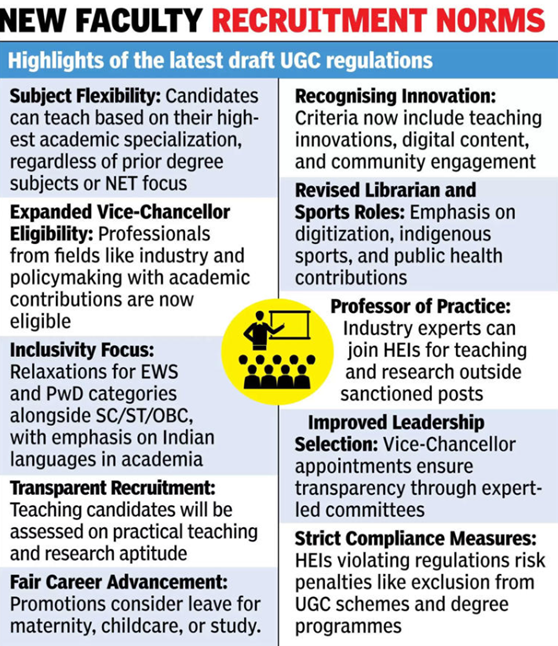By Krishna Jha
In the appointment of vice-chancellors at state universities, the UGC Draft Regulations grant more power to the chancellor. Governors, appointed by the centre, are the ex-officio chancellors of state universities.
It is almost a road block for the field of education to evolve further. It is suggested that each and every appointment would be handpicked since the governors are all responsible to Centre. Thus the final choice would come from those that are directly under the Centre, and never allowed to waver in their choice. Thus, democracy gets one more hit. Like in every sphere of power, our system has become keen to concentrate it in only few hands taken in according to degree of their compromise. At the moment, it is University Grant Commission, at the receiving end to Centre’s plan to appoint vice chancellors which would be done through the draft regulation.
The draft Rules are counted as latest blow with not just several opposition parties, but even members of the Bharatiya Janata Party-led National Democratic Alliance (NDA) have been wary of the change in recruitment norms.
The draft, approved on December 23, 2024, is now Regulations of University Grants Commission from stakeholders across the country.
The new regulations will apply to the central, state, private and deemed universities. All such colleges and universities will have to abide by the new norms within six months of the rules being notified.
Till now the government in the state used to constitute a search committee comprising nominees from the government, university concerned and UGC. The draft regulations state that chancellors/visitors of state universities will constitute a three-member search-cum-selection committee to pick, not necessarily an academic, as vice-chancellors (V-C). In the three-member-committee, the chairman would be the governor’s nominee, and the two other members would be picked up by the UGC chairman and the apex body of the university, interpreted as vice-chancellor, giving near complete control to governors, and consequently, to the Central government in appointing the administrator of the university.
Education is a subject in the concurrent list, which allows both states and Centre t o have a say in the sector. No exclusivity is granted to any side. According to states, the centre’s “unilateral” step will keep them completely out of the recruitment process, thus tampering with the federal structure.
The UGC has claimed that the draft aims to transform faculty recruitment and promotion in Indian higher educational institutes (HEI) by enhancing flexibility and inclusivity and that the proposed guidelines only seek to change selection process for V-Cs by expanding eligibility criteria to include professionals from academia, research institutions, public policy, public administration, and industry.
But the Centre’s motive is clear, and it is not the opposition parties alone that are against these draft rules, but allies of the Bharatiya Janata Party have also come out opposing it. So far as NDA allies are concerned, JDU has conceded that the party is yet to go through the draft Resolution in its entirety, but they also do not agree with the things that are coming out. By limiting the role of elected governments in the appointment of Vice-Chancellors, the efforts of the state government in the field of education has to be discouraged to a great extent, said their spokesperson.
TDP is guarded in its approach. The BRS in Telangana is also among those parties which are opposed to the UGC draft regulation.
In Tamil Nadu, chief minister MK Stalin has passed a resolution for the withdrawal of the UGC draft regulations. He has also written to his counterparts in the Opposition-ruled Himachal Pradesh, Jammu and Kashmir, Jharkhand, Karnataka, Kerala, Punjab, Delhi, Telangana and West Bengal to mobilize support and provide momentum against the draft rules.
Kerala state assembly has passed a unanimous resolution against the UGC draft rules, calling for it to be withdrawn. The Left’s LDF and the Congress-led UDF have joined hands on the issue.
In Bengal, the state higher education department has constituted an eight-member expert committee to review the draft regulations.
There are several other points that go against the draft rules and make it difficult to support. Among such are the new draft guidelines for V-C recruitment that also propose allowing direct appointments of industry experts and senior professionals from public administration, public policy, or public sector undertakings (PSUs). Currently, academicians with at least 10 years of experience as a professor or in a prominent research or academic administrative role are eligible for the position. The move may discourage those serving in the field for years.
The UGC is, in fact, trying to disturb the entire academic ecosystem. It has, for example, proposed that those with a post-graduate (PG) degree in ME or MTech with at least55 percent marks to be eligible for the post of assistant professor (entry level post), without having to clear the UGC-NET exam, which currently is a mandatory requirement.
Another major proposal allows candidates with a PhD in one subject to teach in their specialised field even if their undergraduate or master’s degree was in a different discipline. The UGC has also sought the promotion norms in the faculty. Thus, it has proposed to do away with the API system. Instead, the focus will shift to contributions such as research publications, innovative teaching methods, digital content creation, and securing research funding. (IPA Service)




 Why Are Supreme Court Judges Taking Differing Line On Granting Freebies To The People?
Why Are Supreme Court Judges Taking Differing Line On Granting Freebies To The People? 